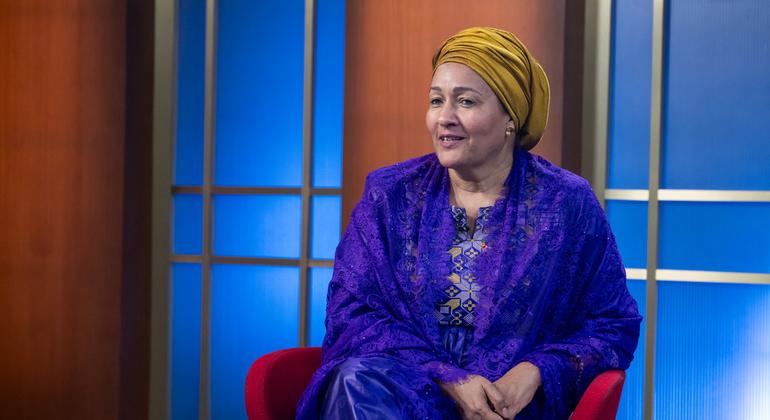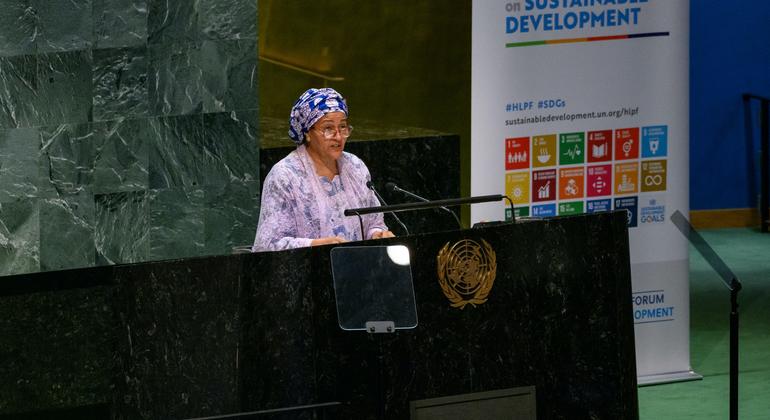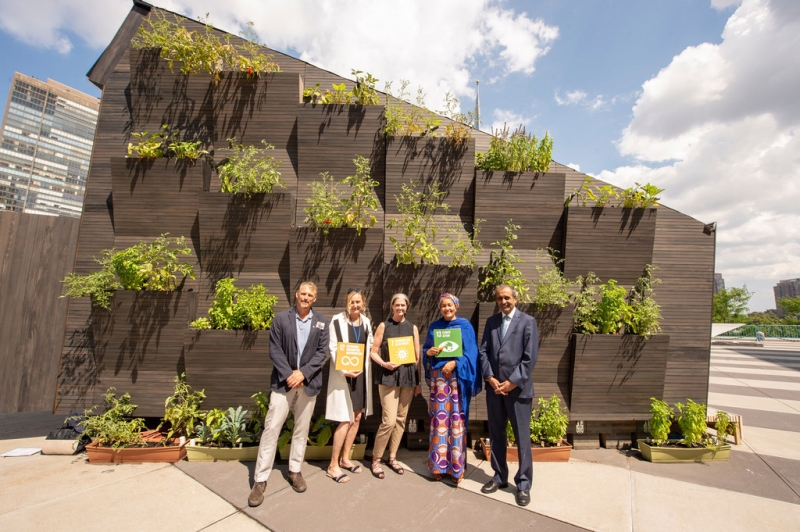
UN Deputy Secretary-General Amina Mohammed meets with children in a refugee camp in Chad. INTERVIEW | First Deputy Head of the UN to participants of the development forum: “Be leaders!” Sustainable Development Goals
At the current rate, only 17 percent of the Sustainable Development Goals (SDGs) that the international community has committed to achieving by 2030 will be achieved on time. The UN Deputy Secretary-General proposes concrete measures to speed up this process and calls on leaders at all levels to “be leaders.” She stated this in an exclusive interview with Mayra Lopez from the UN News Service.
The interview has been shortened in accordance with the site format
Mayra Lopez: This week the international community gathered in New York for the High-Level Policy Forum. What would you like to say to the leaders participating in the forum?
Amina Mohammed: Be leaders to deliver on the commitments made in the SDG Agenda to improve people’s lives. Lead the way to protect the planet and keep warming to 1.5 degrees Celsius. The UN is a place where you will hear the voice of the people, learn about the aspirations and hopes of people. This [the UN meeting] should energize and inspire you to go back to your countries and take action.

ML: The United Nations system proposes six key areas for accelerating action, the so-called “transitions”. Please tell us more about these areas.
AM: When UN member states received an alarming signal last year about the lag in achieving the SDGs, they gave us clear instructions. After all, 15 or 17 percent is a failing grade. We had to think about where to get resources and how to invest them in accelerating the achievement of the SDGs, where the private sector can help, where the UN could expand its support.
We thought it was worth paying special attention to food systems. We remember how the COVID-19 pandemic affected them, how the consequences of the war in Ukraine affected them.
Of course, we managed to launch the Black Sea Grain Initiative, and it saved lives. But I think it was clear that we could do more.
The food system as it stands today is doing a lot to keep us from keeping warming to 1.5 degrees. We must reconsider how we produce food, bring food to the table, and how we involve young people in this process. Investing in food systems is the first line of action.
The second is the energy transition. How do we make sure that everyone has energy, so that everyone has access to it, whether for cooking or in areas of life such as education and healthcare. We must look for solutions, and not necessarily within the power grid. These could be mini-grids that can help power entire communities, especially if we want to link them to food systems.
The third area is connectivity. New technologies already exist, of course. But how do we connect people? And why? For example, we want women to be able to access financial services and communicate with the world through e-commerce without leaving their village. This connection needs to be energized in order for it to work and contribute to food systems.
Then we thought that the education system was not in good shape and realized that it was should be the fourth direction. It’s not like we’re trying to completely reform the system overnight – that’s our ultimate goal, and we’re working toward it.
But what needs urgent attention? Youth cannot find jobs because young people are not getting proper education. So, we want to provide them with access to markets, use technology to do this and make sure that no one is left behind. It is necessary to eliminate the gaps that exist today and create jobs.
It is very important in this context to recall social protection. When people have such a foundation of resilience, shocks such as COVID-19 will no longer knock them off their feet.
Well, protecting the environment is impossible if we don’t recognize the triple crisis of climate, biodiversity and pollution. It’s all part and parcel of our efforts to keep warming to 1.5 degrees.

ML: I would like to dwell on digital innovations. We know that they change the world, both for better and for worse. What makes you optimistic, how can we make sure that technology is at the service of people around the world?
AM: I recently met someone in Barbados. He is the creator of one of the first search engines. I asked him to share his thoughts on today’s technology era. He replied: “It’s wonderful, it’s scary, we’re not ready for it.” I thought he seemed to be able to capture reality in one sentence. The UN Secretary-General put forward his proposals to the participants of the Future Summit on how to take advantage of the potential of such technologies and at the same time protect people from the threat posed by them. Implementing these measures will allow for greater advances in the connected world while strengthening control over how these technologies are used, such as how algorithms are created that are biased against women.
I then asked my interlocutor: “It’s like the transition from a horse-drawn cart to an internal combustion engine?” And he answered: “No, a much larger shift, since we are talking about a change in lifestyle.” We will never be the same because we now have these means of communication.
Urbanization will reach 70 percent by 2050. Imagine that when you check into a hotel, you will no longer be greeted by a living person. You will have a QR code and you can do everything yourself. So many changes await us! We will communicate, learn, and develop differently. I think that all this needs to be discussed, since society is facing such changes.
I hope that we will maintain our foundations and use technology for good, we will not allow it we were controlled.
ML: To achieve the SDGs, we need to join forces. How UN Country Teams and Resident Coordinators are supporting states on this issue?
AM: When we adopted the Sustainable Development Goals [2015-2030] after the Millennium Goals [2000-2015], we moved to a much broader framework. Conceptually, we have moved from a social agenda to an inclusive economy, which requires very different skills. On the other hand, we are also talking about development. This greatly expands the agenda.
Having the UN present in every country is a big advantage because we want each country to take care of its priorities first.
We’re talking about an inclusive economy, about how to help every woman, not just a select few; so that every child feels cared for, and not just some of them. We must take advantage of the opportunities available to demonstrate how to achieve this. The transition we are talking about occurs primarily at the country level. But we need scale. When we help the population of one or two villages, it is very important that we have access to the entire country, to the entire region. Country by country, region by region, we will reach all 8.3 billion people on the planet.

Deputy Secretary-General Amina Mohammed (second from right) at the launch of an eco-living module on display at UN Headquarters in New York.
ML: We are discussing how to accelerate the achievement of the SDGs, but the situation around us is extremely unfavorable due to wars and geopolitical tensions. What do you say about this? Do you think it will be possible to advance the SDGs in such an environment?
AM: Well, we’ll have to go back to your first question. We need leaders. Leaders at all levels. We are talking not only about the head of state, but also about business leaders, civil society organizations, and youth leaders. This is the main thing that gives hope. The revitalization of the UN in this process means that the world body becomes a more powerful platform for the global community, ensuring that everyone’s voice is not only heard, but also motivates others to take action. We don’t have all the power, but we do have a voice that we use. We must always remember that we represent a wide variety of people with very diverse needs.
I think this is very important, we need more equality in the world. It is especially important to find resources to implement the development, peace and security agenda. Security is not what drives military spending, it is investment in conflict prevention. This is development.
The whole system today is unfair, it does not take into account the circumstances of today. It was created to rebuild after World War II so that the war would not happen again for future generations. But the principles on which this protection was built must be applied now: providing people with resources for a normal life. Therefore, we need long-term development financing for every country.
We must understand that after any crisis, such as a pandemic, for example, during recovery it is necessary to build better than before. And this means greener projects, more sustainable solutions for the planet.
I still hope that acceleration will happen, since we are faced with an existential threat, and the goal is to maintain warming within 1.5 degrees hangs in the balance. If people understand this, they cannot sit on the sidelines.
How they react depends on how fairly they feel they are treated by local authorities. national and international level.
We live on a planet with well-connected and vibrant young people. They are excited because they are not sure about the future.
If we talk about terrorists, they are not born. Terrorists are created by an environment that leaves people behind; an environment in which injustice reigns; in which there is no place for hope. And young people become easy prey for those who seek destruction.
But I hope for the best, since the world has never had more resources than now, necessary to move in the right direction. We have an excellent base and route laid out with the help of the SDGs. We just need to get back on our feet and walk that last mile to fulfill our obligations.
